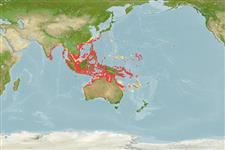>
Eupercaria/misc (Various families in series Eupercaria) >
Caesionidae (Fusiliers) > Caesioninae
Etymology: Caesio: Latin, caesius, bluish-grey, 1835; it is the same name given to the silvery metal (Cs) (Ref. 45335).
More on author: Bloch.
Environment: milieu / climate zone / depth range / distribution range
Sinh thái học
Biển Cùng sống ở rạn san hô; không di cư; Mức độ sâu 1 - 60 m (Ref. 86942). Tropical; 31°N - 28°S, 76°E - 172°E (Ref. 402)
Indo-West Pacific: Sri Lanka to Vanuatu; southern Japan to northern Australia.
Bộ gần gũi / Khối lượng (Trọng lượng) / Age
Maturity: Lm ? range ? - ? cm
Max length : 60.0 cm TL con đực/không giới tính; (Ref. 402)
Các tia vây lưng cứng (tổng cộng): 10; Các vây lưng mềm (tổng cộng): 14-16; Tia cứng vây hậu môn 3; Tia mềm vây hậu môn: 10 - 12. Deep-bodied (Ref. 48636). Scales center lighter than margins; lower 1/3 white, sometimes suffused by pink; prominent black markings on caudal fin absent. 4-5 scales on cheek; predorsal scales 20-26; scaled dorsal and anal fins. Upper peduncular scale rows 9-11; lower peduncular scale rows usually 12-14. Distinguished from C. teres in having a continuous supra-temporal band of scales across the dorsal midline. Basioccipital process for attachment of Baudelot's ligament absent. Post maxillary process single; posterior end of maxilla blunt. Color: Upper body if not yellow, grayish blue; lower sides and belly white or pinkish. Pectoral, pelvic and anal fins white to pink. Large yellow tail. Dorsal fin yellow posteriorly and grayish blue anteriorly. Length usually at 35 cm (Ref. 48636). Head length 2.8-3.6 in SL; body depth 3.0-4.2 in SL (Ref. 90102).
Often in silty areas with low visibility at 1-30 m depth (Ref. 90102). Inhabits coastal areas, usually over rocky and coral reefs. Forms schools in midwater and feeds on zooplankton. Oviparous, with numerous, small pelagic eggs (Ref. 402). Taken primarily by handline in Sri Lanka; caught mostly by fish traps in western Thailand and Malaysia; caught in trawls in the Gulf of Thailand; caught by a variety of methods including drive-in nets, fish traps and gill nets in Indonesia, the Philippines and Papua New Guinea. The most ancestral living caesionid species.
Life cycle and mating behavior
Chín muồi sinh dục | Sự tái sinh sản | Đẻ trứng | Các trứng | Sự sinh sản | Ấu trùng
Carpenter, K.E., 1987. Revision of the Indo-Pacific fish family Caesionidae (Lutjanoidea), with descriptions of five new species. Indo-Pac. Fish. (15):56 p. (Ref. 1723)
IUCN Red List Status (Ref. 130435)
Threat to humans
Harmless
Human uses
Các nghề cá: Tính thương mại
Các công cụ
Special reports
Download XML
Các nguồn internet
Estimates based on models
Preferred temperature (Ref.
123201): 26.1 - 29.1, mean 28.3 °C (based on 1120 cells).
Phylogenetic diversity index (Ref.
82804): PD
50 = 0.5020 [Uniqueness, from 0.5 = low to 2.0 = high].
Bayesian length-weight: a=0.01585 (0.00914 - 0.02749), b=3.08 (2.93 - 3.23), in cm total length, based on LWR estimates for this species & (Sub)family-body (Ref.
93245).
Mức dinh dưỡng (Ref.
69278): 3.4 ±0.45 se; based on food items.
Thích nghi nhanh (Ref.
120179): Trung bình, thời gian nhân đôi của chủng quần tối thiểu là 1.4 - 4.4 năm (Preliminary K or Fecundity.).
Fishing Vulnerability (Ref.
59153): Moderate vulnerability (44 of 100).
Nutrients (Ref.
124155): Calcium = 40 [26, 56] mg/100g; Iron = 0.627 [0.417, 0.912] mg/100g; Protein = 19.1 [18.1, 20.0] %; Omega3 = 0.13 [0.09, 0.18] g/100g; Selenium = 37 [24, 62] μg/100g; VitaminA = 85.9 [35.4, 208.2] μg/100g; Zinc = 0.991 [0.741, 1.300] mg/100g (wet weight);
